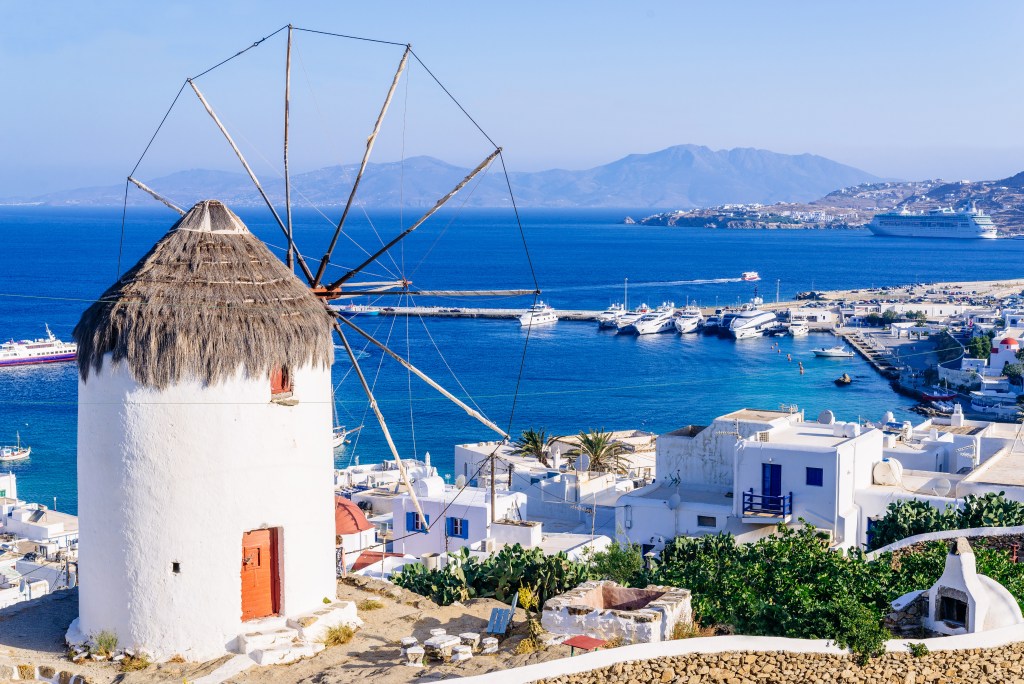12 Things Tourists Should Never Do When Visiting Greece
All recommendations on World Wild Schooling are independently selected by our editors. We may earn an affiliate commission from purchases made through our links.
Famed for its picturesque islands, sandy beaches, turquoise waters, historic landmarks, and delicious cuisine, Greece is one of the world’s most highly sought-after tourist destinations, and with good reason. It doesn’t matter where you visit; you’ll experience new things, find many things to see and do, and enjoy an adventure-packed vacation.
However, before your trip to Greece, you must be aware of some things. Like any country, Greece has many do’s and don’ts. To help you avoid common mistakes, we’ve compiled a list of 12 things tourists should never do when visiting Greece. Avoiding these mistakes will allow you to enjoy a hassle-free, fun-filled vacation.
As a Greek who has lived in Greece for years, these are the most common mistakes tourists make when visiting my home country.
Swipe and Vote: See What Travelers Recommend
Which Greek faux pas are you most likely to commit?
This is a swiper quiz, swipe right for yes, swipe left for no.
 © Maglara / Adobe Stock
© Maglara / Adobe Stock
 © kite_rin / Adobe Stock
© kite_rin / Adobe Stock
 © EgoR / Adobe Stock
© EgoR / Adobe Stock
 © Taiga / Adobe Stock
© Taiga / Adobe Stock
 © A.Jedynak / Adobe Stock
© A.Jedynak / Adobe Stock
Results
 1
1
 2
2
 3
3
 4
4
 5
5
Don’t Try To See Too Much in One Vacation

Arguably, the biggest mistake tourists can make when visiting Greece, especially for the first time, is trying to see too much in one trip. While seeing as much as possible during your Greek getaway can be tempting, seeing it all in one holiday is impossible. Unfortunately, or maybe fortunately, if you want to see everything Greece offers, you must visit multiple times.
If you try to see it all in one trip, you’ll tire yourself out, miss some of the things you want to see, and ultimately ruin your trip. With that in mind, take it easy, relax, and only plan to visit a few places. It’s always worth remembering that life in the Greek islands moves slower, so don’t rush around.
Read also: Greece Trip Planning Tips
Don’t Visit Only the Most Popular Islands

Another big mistake many tourists make on vacation in Greece is only visiting the most popular islands. While destinations like Mykonos and Santorini are breathtaking, they’re often overcrowded and filled with tourist traps. You’ll usually find overpriced accommodations, unauthentic souvenirs, and large crowds at famous attractions.
On the other hand, Greece’s lesser-known tourist destinations tend to be cheaper, and crowds are smaller. These places are usually much quieter and offer a more authentic experience. There are over 6,000 Greek Islands and islets, of which 227 are inhabited, so you have plenty of options. Our favorite lesser-visited Greek destinations include Lefkada, Amorgos, and Kefalonia.
Read also: Amazing Greek Islands Beyond Santorini
Don’t Always Eat at the Beach

If you want to make your money go further during your Greek island getaway, avoid always eating and drinking at beachfront cafes, bars, and restaurants. Food prices in beachfront locations almost always increase to target tourists. Don’t be surprised if the food you ordered is 20% to 30% more expensive than the food you ordered in a taverna a couple of streets away.
We’re not telling you never to eat at the beachfront because it can be a lovely experience and a great way to admire the sunset. However, avoid doing it consistently if you’re traveling on a budget. To avoid this tourist trap, eat before or after you’ve visited the beach. You’ll find many cheap eats a ten or 15-minute walk from the beachfront.
Read also: Most Expensive Cities to Live in Greece
Don’t Forget to Leave a Tip

Generally, there isn’t a strong tradition of tipping in Greece, especially among the locals. However, it’s become expected of tourists. Of course, you don’t have to tip if you weren’t happy with the service you received but don’t forget to leave one if you enjoyed your dinner.
When dining in cafes, bars, and restaurants, it’s customary to leave a small cash tip for the person who looked after you. Before leaving a tip, make sure a service charge isn’t included on your bill. If one is, you don’t need to leave a tip unless you want to give more.
Read also: Greece Getaway Money Saving Tips
Don’t Eat in a Restaurant Before Checking the Prices

Like most countries, Greece is prone to tourist scams, so you must stay vigilant to avoid unnecessarily losing money. One of the most common scams in Greece is restaurants overcharging tourists for food and drink by not listing their prices on the menu. Therefore, checking the menu before ordering anything at a restaurant is important.
The simplest way to avoid overpaying for food and drink is to avoid eating at restaurants that don’t include prices on the menu. You should also look for hidden tricks. For example, some restaurants list the prices of cocktails as a shot. Each cocktail will contain three or four shots, so you’ll pay three or four times more than expected. This is not a widespread practice, but still good to know about it.
Read also: Amazing Greek Dishes To Try
Never Raise Your Palm to a Local

Tourists visiting Greece are often unaware of how insulting it is to raise your palm to a local. Referred to as ‘moutza,’ raising your palm is the worst hand gesture in Greece. It involves holding your hand like a ‘stop’ sign and showing someone the palm of your hand fully open with your fingers spread out.
In Greece, this hand gesture is equivalent to giving someone two fingers in the United Kingdom or the middle finger in the United States. Luckily, this mistake is easily avoidable. Simply never raise your palm to a local, and you won’t offend, upset, or anger anyone. It’s also a good idea not to wave in case someone finds it rude.
Read also: Sailing in the Greek Islands
Save this
Don’t Drive Like a Greek

Driving in the Greek islands can be scary or fun, depending on your approach. If you drive sensibly, you’ll likely enjoy driving in Greece because you’ll drive along picturesque coastal roads through scenic countryside and find an array of beautiful hidden gems.
However, your experience will be very different if you drive like the locals. Greek drivers are renowned for driving fast, loose, and dangerously, often making three lanes out of two. We were once clipped by a bus driving erratically. The roads can be narrow and winding, especially on some islands, which doesn’t help either.
Don’t feel pressured to keep up with them by driving the same way. That’s how accidents happen, and accidents will ruin your vacation. Instead, when it’s safe, pull over and let them pass before carrying on with your relaxing drive.
Read also: Spectacular Secluded Greek Islands
Don’t Always Travel Around by Tour Bus

If you don’t want to hire a car during your Greek vacation, we recommend using public transport instead of constantly hopping on a tour bus. While traveling by tour bus is a convenient way to visit an island’s main attractions, it’s generally much more expensive than local transport.
It’s not uncommon for tour buses to stop at overpriced restaurants and souvenir shops in the middle of nowhere, either. Besides, taking public transport is a more authentic way to travel. It might take longer, but you’ll see more, experience local life, and have the opportunity to meet new people. You might also come across hidden gems tour buses don’t visit.
Read also: Greek Islands for Exciting Adventure
Don’t Forget To Pack Your Sunscreen

Greece is much loved for its warm, sunny climate and an average of 250+ days of sunshine yearly. In the height of the summer, temperatures above 86°F (30°C) can be expected most days across mainland Greece and the Greek islands. As such, don’t forget to pack your sunscreen.
If you forget to pack your sunscreen, your time at the beach will quickly turn sour, as you’ll likely burn. This isn’t just sore; it can also have severe health implications that can ruin your vacation. You can easily avoid burning by lathering your body in strong sunscreen in the morning and reapplying it every couple of hours or after you’ve been in the sea.
Read also: Most Beautiful Greek Islands
Don’t Spend Everyday at Your All-Inclusive Hotel

All-inclusive hotels in Greece offer everything we need to enjoy a relaxing vacation. We often don’t have to go anywhere to access food, drink, a swimming pool, or a beach. Therefore, spending the whole time sunbathing by the pool, eating in the on-site restaurant, and strolling along the beach can be tempting.
Unfortunately, as lovely as it may sound, spending every day at your all-inclusive hotel is a huge mistake. You might feel refreshed and rejuvenated, but you won’t have experienced authentic Greece during your vacation. With that said, leave your hotel, explore the local area, and eat at a local taverna to experience Greece at its finest. You won’t regret it!
Read also: Cheap Greek Island Getaways
Don’t Flush Toilet Paper

While some hotels and resorts in Greece allow toilet paper flushing, mostly in built-up areas like Athens, most will ask you to refrain from flushing toilet paper down the toilet. Instead, you’ll be asked to place used toilet paper in a waste bin beside the toilet. The reasoning is pretty simple.
You can’t flush toilet paper in most of Greece, especially on the islands and in more rural areas, because the sewage pipes are much narrower than elsewhere. Therefore, flushing toilet paper down the toilet can easily clog the drains. For obvious reasons, you shouldn’t flush other items, such as baby wipes or sanitary towels, down the toilet, either.
Read also: Athens Travel Guide
Don’t Wear Inappropriate Clothing at Historic or Religious Sites

In Greece, many tourist attractions, such as historic landmarks and religious sites, have strict dress codes that must be followed. If you don’t follow these dress codes and wear clothing that is deemed inappropriate, you’ll likely be denied entry or asked to leave. You might also be seen as disrespectful.
For starters, it’s illegal to wear high heels when visiting archaeological sites in Greece, including the Acropolis of Athens and the Parthenon. This law was implemented to protect the monuments and their surroundings from abrasion. Meanwhile, at most religious sites in Greece, visitors are required to wear clothes that cover their knees, shoulders, and sometimes arms.
Read also: Must-Visit Historical Sites in Greece
Pin It Now, Read It Later










